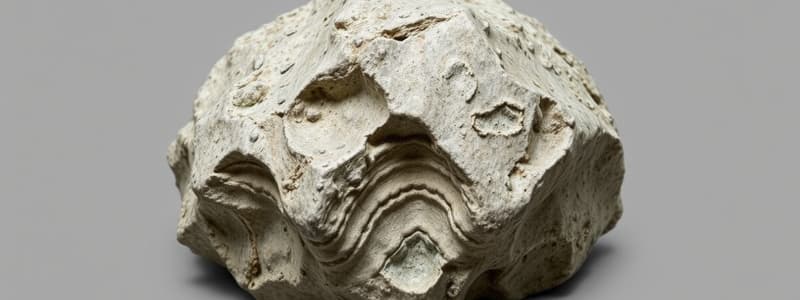Podcast
Questions and Answers
What is relative dating?
What is relative dating?
- The actual age of an event or object in years
- Determining whether an event or object is older or younger than others (correct)
- The breakdown of radioactive isotopes
- An arrangement of rock layers
What is absolute dating?
What is absolute dating?
- The time it takes for half of an isotope to decay
- An atom with a different number of neutrons
- A method of determining the actual age of an event or object (correct)
- A break in the geologic record
What is an isotope?
What is an isotope?
- A type of fossil
- An arrangement of rock layers
- An atom with the same number of protons but different neutrons (correct)
- The study of fossils
What is radioactive decay?
What is radioactive decay?
What is radiometric dating?
What is radiometric dating?
What is half-life?
What is half-life?
What is a geologic column?
What is a geologic column?
What is an unconformity?
What is an unconformity?
What is paleontology?
What is paleontology?
What is a fossil?
What is a fossil?
What is an index fossil?
What is an index fossil?
What is a trace fossil?
What is a trace fossil?
What is extinction?
What is extinction?
What is uniformitarianism?
What is uniformitarianism?
What is catastrophism?
What is catastrophism?
What is the law of superposition?
What is the law of superposition?
Flashcards are hidden until you start studying
Study Notes
Geologic Dating Methods
- Relative dating determines the age of an object or event in relation to others, rather than providing an exact age.
- Absolute dating measures the actual age of an event or object in years, offering precise chronological data.
Isotopes and Radioactivity
- An isotope is an atom that has the same number of protons but a different number of neutrons, resulting in varied atomic mass for the same element.
- Radioactive decay refers to the process where unstable isotopes transform into stable isotopes, potentially changing the original element.
- Radiometric dating estimates the age of an object by calculating the ratio between parent isotopes (original) and daughter isotopes (decay products).
- The half-life of an isotope is the duration required for half of its radioactive atoms to decay, crucial for radiometric dating accuracy.
Rock Layers and Fossils
- A geologic column is a stratified arrangement of rock layers, with the oldest layers located at the bottom.
- An unconformity signifies a gap in the geological record due to erosion or prolonged periods without sediment deposition.
- Paleontology is the study of fossils, which are critical for understanding past life forms and environments.
- A fossil is a preserved trace or remnant of an organism from the past, commonly found in sedimentary rock.
Types of Fossils
- An index fossil is a fossil exclusive to a specific geological age, aiding in dating rock layers.
- A trace fossil is a mark created in soft sediment by an animal's movement, providing insight into behaviors and environments.
Extinction and Geological Principles
- Extinction refers to the complete loss of every member of a species, a critical aspect of biological and ecological history.
- Uniformitarianism is the principle that past geological processes can be understood through current processes, suggesting a stable Earth.
- Catastrophism proposes that significant geological changes occur suddenly, often due to extraordinary events.
- The law of superposition states that in undisturbed layers, younger rocks are positioned above older rocks, establishing a relative chronological framework.
Studying That Suits You
Use AI to generate personalized quizzes and flashcards to suit your learning preferences.




